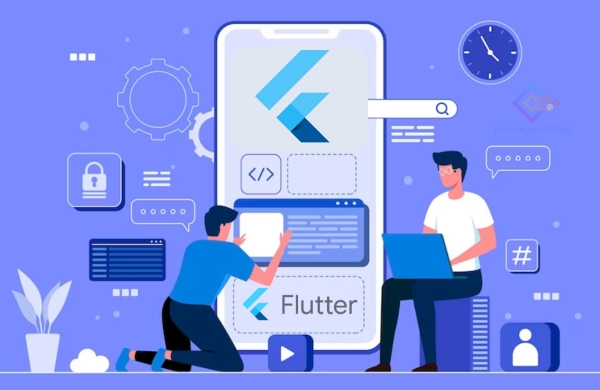
The constant evolution of mobile app development renders Flutter as the advanced platform that entrepreneurs utilize to build top-notch apps. The purpose of this article is to emphasize all aspects of Flutter app development services as well as to discuss what benefits are brought by Flutter. The guide will also help you create on-point brands for your app.
What is Flutter?
Flutter, designed by the Google team, is an open-source UI framework that permits a developer to release the same application on mobile, desktop, and web using just one code line. It is based on Dart programming and provides a really rich set of widgets for development of the fantastic user interfaces.
Advantages of Flutter
Cross-Platform Development:
Flutter capacity makes developers compose code just once and release it on all devices, including Apple devices, Android, web, and desktops. Therefore, this also makes its development inexpensive and easier.
Fast Performance:
Architecture knowledge and the ‘hot-reload’ capabilities of Flutter make the framework a powerful tool for swift development cycles with good performance deliveries, and providing smooth animations or a fluid user experience.
Beautiful UIs:
With the usage of a variety of customizable widgets in the robust widget library of Flutter, Flutter developers can create mesmerizing designs that are precise on a pixel level and still suited for different brands and user preferences.
Native Performance:
The native code is the one that Flutter’s apps help to compile, to use the platform-specific features as add-ons that improve performance and thus enhance user engagement and satisfaction.
Community Support:
Flutter has a strong and valuable developer community; they can assist their experienced resources which are custom-built plugins and libraries that make the process of development easy and help to solve various problems efficiently.
Also Read: Top 5 Flutter 3.13 Libraries for Enhanced App Development
What are Flutter App Development Solutions for Brands?
The incorporation of Flutter into the ASP.NET solution will be the combination of the strong aspects of both platforms to achieve a smooth and robust solution. Here are five key pointers for Flutter-ASP.NET integration:
Custom App Development:
With Flutter, brands develop individual and specific applications full of intriguing features to satisfy the special requirements of their clients, which improves brand image and user experience.
UI/UX Design:
Through Flutter’s advanced design capability, brands can create user interfaces that are easy to use and visually appealing, which will enable them to engage their target audiences in a positive manner.
Integration Services:
Flutter makes it possible for brands to incorporate pre-existing services, APIs, and backend systems, which helps expand the functionality and uses of the apps they create.
Maintenance and Support:
Flutter app development companies deliver ongoing management with updates and support, which are used to ensure the app’s quality, security, and device compatibility with a growing platform.
Also Read: Fintech Mobile App Development: Unleashing the Potential of Cross Platform Solutions
Significance of Flutter -ASP.NET Integration
API Communication:
Having WEB API or RESTful services as an intermediary between the Flutter user interface and the ASP.NET system will eliminate the possibility of data loss thus all operations will be integrated to form a complete system.
Authentication and Authorization:
ASP.NET is capable of providing secured access to the backend resources by using OAuth, JWT, or any other authentication service. Thus, secure communication between a Flutter app and the server is effectively ensured.
Database Integration:
Decide on the particular data access technology e.g. Entity Framework etc. for databases such as SQL Server, MySQL, and MongoDB. It enables an app in terms of information storage and transfer.
Real-time Communication:
Implement either SignalR or WebSocket in ASP.NET for real-time communication that will enable instant updates, messages, and shared features through the Flutter app and the server.
Cross-Platform Compatibility:
Compatibility should be taken into account when designing API, data model, and application logic, ensuring easy plug-and-play of them into the Flutter mobile app and ASP.NET web application.
Also Read: Top 4 Frameworks for Building Hybrid Mobile App
Conclusion
Flutter has utterly transformed the field of mobile app development. It provides a complete solution to the business communities for the purpose of creating their very own multi-platform applications of unmatched performance and creative freedom.
Brands are able to achieve communication and impact using the Flutter development services which are focused on such experiences as forging user engagement, brand loyalty, and business growth.
With the result of the mobile market going for a permanent change, Flutter currently takes the lead in the market, letting brands stay competitive and innovative in terms of their digital standard.
Businesses can decide to partner with a Flutter mobile app development company or ASP.NET web application provider for project enhancements.
FAQs
Flutter makes use of the Dart programming language for coding and it gives access to the Dart SDK that provides great implementation tools for developing self-enhancing widgets in order to be able to compose excellent user interfaces.
During a combination process of Flutter and ASP.NET, the developers will enjoy Flutter's great UI and the backend functionality of ASP.NET coming together resulting in an effort to build modern and feature-filled web apps.

Leave a Reply